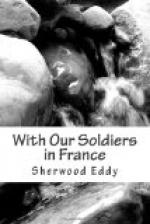Among the obvious evil results of war we would be compelled to name at least ten: The wanton destruction of human life; the maiming and suffering inflicted upon the wounded; the breaking up of homes and the terrible suffering caused to women and children; the loss of wealth and property, with the subsequent hardship for the poor which it entails, and the destruction of art, architecture, and the higher material accomplishments of civilization; the outbreak of immorality and drunkenness, which always accompanies war; the hardening of the finer sensibilities of men through the cruelty and barbarity of modern warfare; the increase of hatred and suspicion; the dividing of humanity and the destruction of its sense of unity, brotherhood, and cooperation; the breakdown of international law and respect for law and order; and the loss of reverence for human life and the sense of its priceless value.
An equal number of possible good effects may be mentioned which war may at times call out: The development of courage and heroism; the call to sacrifice in the sinking of selfish individual interests for the sake of a cause; the discipline of obedience and the development of corporate action; the bringing of men out of selfish and careless lives to the facing of the great realities of God, life, death, and immortality; the awful object lesson of the results of sin, both personal and national, and the teaching of the terrible lesson that “the wages of sin is death”; the widening of men’s horizons, the breaking of old molds, ruts, and restrictions and the opening of men’s minds to new ideas; the chastening and mellowing influence of suffering, with its possible development of sympathy, tenderness, and unselfishness; the deepening of the sense of brotherhood within a single nation with the sinking of the false or artificial social distinctions of peace time; the strengthening of religious unity by the stripping off of nonessentials and the laying bare of the great simple fundamentals; and the new contact with the practical ministry of religion in hours of deepest need in camps, in hospitals, and on the battlefields, with the resultant strengthening hold on the great verities of the love of God, the cross of Christ, and the service of men.
It will depend upon the individual and his theories of life how he will strike the balance between these two sides of the good and evil of war. While the good effects of a war are seen more clearly after it is over, certainly during the war the vast majority of men at the front would almost unanimously agree that the preponderating influence and effect for the time being is evil.




